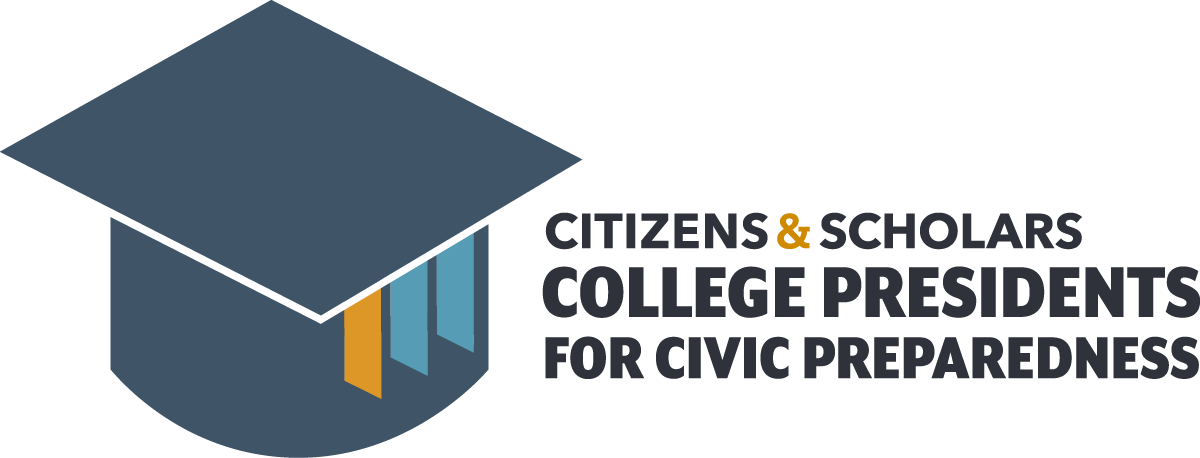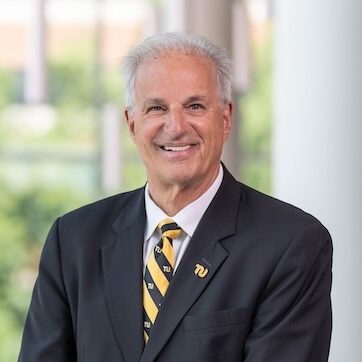Free expression is a critically important element of a civil society and an essential part of university life. It is important to our university community and reflects our core values that promote civil discourse and civic preparedness.
- Mark Ginsberg
Activation Plan

Towson University’s (TU) 2020-30 Strategic Plan “Leadership for the Public Good” names devotion to civic responsibility and community engagement as a core value and encourages faculty and staff to create opportunities that “challenge students to be engaged participants in an inspiring educational journey preparing them for professional success and positive impact as engaged members of their communities.” TU’s current Diversity Strategic Plan, A More Inclusive TU: Advancing Equity & Diversity (2020 – 2025) aligns with the institution’s civic engagement efforts, with specific campus climate action items focused on grounding community and civic engagement efforts in diversity, equity, inclusion, and justice.
The Division of Student Affairs Strategic Roadmap (2022-2030) identifies building on TU’s commitment to civic engagement as a key strategy to enhance students’ leadership development and encourages departments in the Division to utilize this strategy to develop programs and initiatives.
The Office of Civic Engagement & Social Responsibility (CESR) leads TU’s civic learning and democratic engagement efforts and offers many opportunities for TU students, staff, and faculty to participate in civic life and to develop the disposition, skills, and knowledge to be active co-creators of a shared future. CESR also coordinates the TU Votes Coalition. This cross-divisional group of students and staff supports the institutionalization of civic learning and democratic engagement.
The Civic Transformation Living Learning Community (LLC) fosters meaningful connections among TU students, staff and faculty who are passionate about actively co-creating just and equitable communities. The LLC explores social justice issues through the lens of public policy, civic engagement and community-based learning. Residents in this LLC learn about the intersection of community engagement, civic engagement, equity, diversity, inclusion and social justice. Students also identify pathways for lifelong active participation in civic life (e.g., neighborhoods, workplaces, organizations).
Civic Renewal Initiative, which utilizes restorative practices and dialogue to foster democratic engagement. The Initiative offers opportunities for the TU community to engage in civil conversations about current local, national, and global issues. The Civic Renewal Fellowship is a one-year cohort-based training program that teaches restorative practices and dialogue to prepare fellows to facilitate conversations about current events effectively.
The Social Action Collaboratory is a yearlong program in which students cultivate individual and collective capacities to foster transformative social change. Each cohort focuses on a different social justice topic.
Impact TU provides an opportunity for 500 TU students to engage with community partners who are committed to fostering sustainable communities. Students learn about local efforts toward developing sustainable communities and then engage in hands-on projects focused on environmental sustainability, economic security, social well-being, and civic engagement. Project sites are on campus and in the Towson-Baltimore area.
The Perspectives category in the Towson University Core Curriculum includes courses in Metropolitan Perspectives, the United States as a Nation, Global Perspectives, Diversity and Difference, and Ethical Issues and Perspectives. The learning outcomes in this category are focused on societal and cultural issues and the development of different perspectives.
Democracy Today provides opportunities for cross-disciplinary and cross-departmental collaboration to address overarching questions: What makes a 21st century society democratic? How can democracy be sustained in the United States? What role and responsibility do higher education and the liberal arts have in sustaining a democratic society?
Dialogue@TU offers opportunities for TU staff and faculty to develop a perspective that prioritizes TU’s increasingly diverse campus to find more opportunities to learn about each other, our identities, our experiences, and our views.
The Retreat for Social Justice gives students an opportunity to explore their cultural identities and interact with people from diverse backgrounds while developing skills for interrupting prejudice, advocating for social justice and inclusion, and helping to build the cultural capacity on campus.
Restorative Practices Training introduces participants to ideas of shared power and responsibility, challenging all members of a community to do things with others rather than to them or for them. It provides participants with an understanding of the theories and concepts that frame restorative work, introduces restorative tools and provides opportunities to apply them.
The Social Justice Workshop Series introduces fraternity and sorority leaders to concepts of oppression and allyship and provides them with an opportunity to identify how their chapters can create an inclusive community.
Tiger Pride Day is an annual day of legislative advocacy during the Maryland General Assembly in Annapolis in which 100 students, staff, and faculty participate.
High Impact Practices Community of Practice: A university-wide effort to increase high-impact programs and initiatives designed to support student retention and graduation.
TU Community of Belonging: Intentional efforts to foster an inclusive, equitable, and collaborative community in which its members put each other’s humanity at the forefront, develop shared accountability, communicate respectfully across differences, and engage in conflict resolution collectively.
Civic and Community Engagement Ecosystem: A cross-divisional effort to advance opportunities for student, staff, and faculty civic learning, which includes coordinating civic and community engagement across TU, establishing curricular and co-curricular pathways, expanding justice-centered engagement training institutionally, creating an equity-focused support and reward system, streamlining assessment and evaluation, and increasing resources and support. The TU Engagement Glossary provides civic and community engagement definitions and concepts that are “intended to be applied through anti-racist and justice-centered approaches to address inequities that impact our campus community and the Greater Baltimore region.”
Tiger Advocacy Advisory Team (TAAT): Under the leadership of the Division of Student Affairs and the Office of Inclusion & Institutional Equity, TAAT is charged with educating and supporting students on activism on and off campus, coordinating the appropriate level of response for different events, and serving as the primary liaisons between administrators, the TU Police Department, and students. The team connects with event organizers, protesters and counter-protesters, identifies trusted faculty and staff to aid in facilitating conversations and provides support for event logistics.
TAAT also provides “just-in-time” guidance in the event of spontaneous demonstrations, including but not limited to referring event organizers, protesters and counter-protesters to a campus webpage on activism, advising students on campus policies and local, state and federal laws, and providing printed resources with emergency contact information for students in crisis.
Campus Climate Survey: The Office of Inclusion & Institutional Equity (OIIE) administers a Campus Climate Survey, which tracks TU’s progress and measures the impact of the original action items in the Diversity Strategic Plan. In Fall 2023, both students and employees completed the survey. The university contracted with Campus Climate Surveys, LLC to administer both surveys. The survey includes questions about political climate and civic engagement.
President Ginsberg signed the ALL IN Campus Democracy Challenge Commitment to Full Student Voter Participation. President Ginsberg annually nominates TU students for the Transform Mid-Atlantic Civic Fellowship and the Campus Compact Newman Civic Fellowship. The South Campus Pavilion serves as a polling location and is also the site of a mail-in ballot drop box.
TU’s 2024 Campus Democratic Action Plan identifies goals the institutions aims to reach by 2034:
- Infuse civic learning and democratic engagement into the first-year experience.
- Infuse civic learning and democratic engagement into the general education curriculum.
- Increase student voter registration rates to 95% and student voter turnout rates to 80%.
- Institutionalize communication practices that convey the importance of voting to students from all backgrounds.
- Infuse civic learning and democratic engagement with co-curricular diversity, equity, inclusion, and justice campus efforts.
The Office of Inclusive Excellence Education & Support will be piloting a series of workshops and directed reading/discussion groups in fall 2024 that prioritize engaging, navigating and communicating across difference. Inspired by the Disagree Better efforts of Utah Governor Spencer Cox and at Utah State University, IEES is coalescing campus partners to provide recurring opportunities – particularly during a time of state and federal elections – for members of the TU community to build skills of deep listening, curiosity and wonder, free expression and inquiry, and belonging.


Towson University’s (TU) 2020-30 Strategic Plan “Leadership for the Public Good” names devotion to civic responsibility and community engagement as a core value and encourages faculty and staff to create opportunities that “challenge students to be engaged participants in an inspiring educational journey preparing them for professional success and positive impact as engaged members of their communities.” TU’s current Diversity Strategic Plan, A More Inclusive TU: Advancing Equity & Diversity (2020 – 2025) aligns with the institution’s civic engagement efforts, with specific campus climate action items focused on grounding community and civic engagement efforts in diversity, equity, inclusion, and justice.
The Division of Student Affairs Strategic Roadmap (2022-2030) identifies building on TU’s commitment to civic engagement as a key strategy to enhance students’ leadership development and encourages departments in the Division to utilize this strategy to develop programs and initiatives.
The Office of Civic Engagement & Social Responsibility (CESR) leads TU’s civic learning and democratic engagement efforts and offers many opportunities for TU students, staff, and faculty to participate in civic life and to develop the disposition, skills, and knowledge to be active co-creators of a shared future. CESR also coordinates the TU Votes Coalition. This cross-divisional group of students and staff supports the institutionalization of civic learning and democratic engagement.
The Civic Transformation Living Learning Community (LLC) fosters meaningful connections among TU students, staff and faculty who are passionate about actively co-creating just and equitable communities. The LLC explores social justice issues through the lens of public policy, civic engagement and community-based learning. Residents in this LLC learn about the intersection of community engagement, civic engagement, equity, diversity, inclusion and social justice. Students also identify pathways for lifelong active participation in civic life (e.g., neighborhoods, workplaces, organizations).
Civic Renewal Initiative, which utilizes restorative practices and dialogue to foster democratic engagement. The Initiative offers opportunities for the TU community to engage in civil conversations about current local, national, and global issues. The Civic Renewal Fellowship is a one-year cohort-based training program that teaches restorative practices and dialogue to prepare fellows to facilitate conversations about current events effectively.
The Social Action Collaboratory is a yearlong program in which students cultivate individual and collective capacities to foster transformative social change. Each cohort focuses on a different social justice topic.
Impact TU provides an opportunity for 500 TU students to engage with community partners who are committed to fostering sustainable communities. Students learn about local efforts toward developing sustainable communities and then engage in hands-on projects focused on environmental sustainability, economic security, social well-being, and civic engagement. Project sites are on campus and in the Towson-Baltimore area.
The Perspectives category in the Towson University Core Curriculum includes courses in Metropolitan Perspectives, the United States as a Nation, Global Perspectives, Diversity and Difference, and Ethical Issues and Perspectives. The learning outcomes in this category are focused on societal and cultural issues and the development of different perspectives.
Democracy Today provides opportunities for cross-disciplinary and cross-departmental collaboration to address overarching questions: What makes a 21st century society democratic? How can democracy be sustained in the United States? What role and responsibility do higher education and the liberal arts have in sustaining a democratic society?
Dialogue@TU offers opportunities for TU staff and faculty to develop a perspective that prioritizes TU’s increasingly diverse campus to find more opportunities to learn about each other, our identities, our experiences, and our views.
The Retreat for Social Justice gives students an opportunity to explore their cultural identities and interact with people from diverse backgrounds while developing skills for interrupting prejudice, advocating for social justice and inclusion, and helping to build the cultural capacity on campus.
Restorative Practices Training introduces participants to ideas of shared power and responsibility, challenging all members of a community to do things with others rather than to them or for them. It provides participants with an understanding of the theories and concepts that frame restorative work, introduces restorative tools and provides opportunities to apply them.
The Social Justice Workshop Series introduces fraternity and sorority leaders to concepts of oppression and allyship and provides them with an opportunity to identify how their chapters can create an inclusive community.
Tiger Pride Day is an annual day of legislative advocacy during the Maryland General Assembly in Annapolis in which 100 students, staff, and faculty participate.
High Impact Practices Community of Practice: A university-wide effort to increase high-impact programs and initiatives designed to support student retention and graduation.
TU Community of Belonging: Intentional efforts to foster an inclusive, equitable, and collaborative community in which its members put each other’s humanity at the forefront, develop shared accountability, communicate respectfully across differences, and engage in conflict resolution collectively.
Civic and Community Engagement Ecosystem: A cross-divisional effort to advance opportunities for student, staff, and faculty civic learning, which includes coordinating civic and community engagement across TU, establishing curricular and co-curricular pathways, expanding justice-centered engagement training institutionally, creating an equity-focused support and reward system, streamlining assessment and evaluation, and increasing resources and support. The TU Engagement Glossary provides civic and community engagement definitions and concepts that are “intended to be applied through anti-racist and justice-centered approaches to address inequities that impact our campus community and the Greater Baltimore region.”
Tiger Advocacy Advisory Team (TAAT): Under the leadership of the Division of Student Affairs and the Office of Inclusion & Institutional Equity, TAAT is charged with educating and supporting students on activism on and off campus, coordinating the appropriate level of response for different events, and serving as the primary liaisons between administrators, the TU Police Department, and students. The team connects with event organizers, protesters and counter-protesters, identifies trusted faculty and staff to aid in facilitating conversations and provides support for event logistics.
TAAT also provides “just-in-time” guidance in the event of spontaneous demonstrations, including but not limited to referring event organizers, protesters and counter-protesters to a campus webpage on activism, advising students on campus policies and local, state and federal laws, and providing printed resources with emergency contact information for students in crisis.
Campus Climate Survey: The Office of Inclusion & Institutional Equity (OIIE) administers a Campus Climate Survey, which tracks TU’s progress and measures the impact of the original action items in the Diversity Strategic Plan. In Fall 2023, both students and employees completed the survey. The university contracted with Campus Climate Surveys, LLC to administer both surveys. The survey includes questions about political climate and civic engagement.
President Ginsberg signed the ALL IN Campus Democracy Challenge Commitment to Full Student Voter Participation. President Ginsberg annually nominates TU students for the Transform Mid-Atlantic Civic Fellowship and the Campus Compact Newman Civic Fellowship. The South Campus Pavilion serves as a polling location and is also the site of a mail-in ballot drop box.
TU’s 2024 Campus Democratic Action Plan identifies goals the institutions aims to reach by 2034:
- Infuse civic learning and democratic engagement into the first-year experience.
- Infuse civic learning and democratic engagement into the general education curriculum.
- Increase student voter registration rates to 95% and student voter turnout rates to 80%.
- Institutionalize communication practices that convey the importance of voting to students from all backgrounds.
- Infuse civic learning and democratic engagement with co-curricular diversity, equity, inclusion, and justice campus efforts.
The Office of Inclusive Excellence Education & Support will be piloting a series of workshops and directed reading/discussion groups in fall 2024 that prioritize engaging, navigating and communicating across difference. Inspired by the Disagree Better efforts of Utah Governor Spencer Cox and at Utah State University, IEES is coalescing campus partners to provide recurring opportunities – particularly during a time of state and federal elections – for members of the TU community to build skills of deep listening, curiosity and wonder, free expression and inquiry, and belonging.
Free expression is a critically important element of a civil society and an essential part of university life. It is important to our university community and reflects our core values that promote civil discourse and civic preparedness.
- Mark Ginsberg
